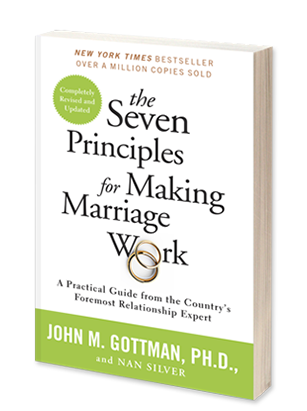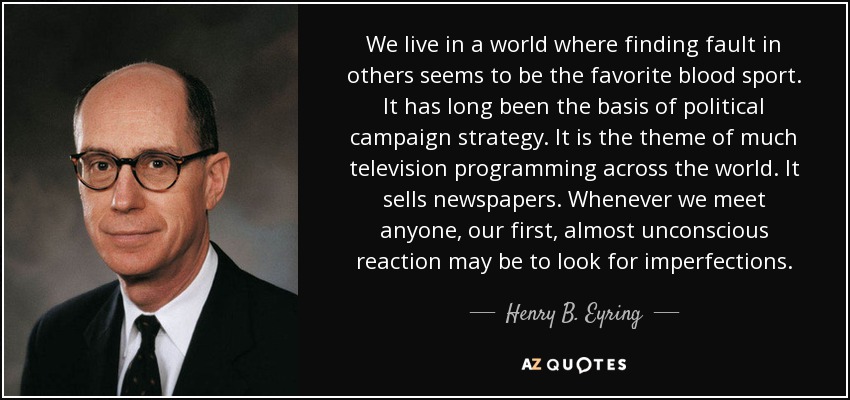"God has graciously given each of us an early warning system. When we are feeling irked, annoyed, or irritated with our spouse, we have our backs turned toward heaven. We are guilty of Pride."
-H. Wallace Goddard, Ph. D.
This week, we will be discussing pride and its effects on a marriage. Pride, according to Ezra Taft Benson, is enmity--to God, to a spouse, or to any of our fellow men (Benson, 1985, p. 2). The elements of pride are selfishness, conceit, boastfulness, arrogance, jealousy, or haughtiness (p. 1). In a marriage, it can look like this:
• Ignore spouse, or give spouse the "cold shoulder"
• Impatient with impatience
• Caught up in who's right and who's wrong
• Blaming, defensiveness
• Attack, counterattack
• Score keeping, with intentions of noting who is winning or losing
• Refusal to apologize first
• Holding the other hostage by refusing to forgive
• Proving superiority by bringing up spouse's faults
• The "silent treatment"
• Sharing spouse's weaknesses with others
• Intentionally trying to create jealousies in spouse
• Get others to create an alliance with you against your spouse
• Putting words in spouse's mouth to manipulate them
• Displaying an attitude of entitlement in the marriage
• Stubbornness or unwillingness to change
• Selfishness; thinking only of your needs
• Unwillingness to learn from spouse
• Fault finding
• Withholding love and affection
Pride has no place in a healthy marriage. It is the root cause of Gottman and Silver's "four horsemen of the apocalypse": criticism, contempt, defensiveness, and stonewalling. Therefore, pride is the root cause of marital discord and destruction.
The opposite of pride is humility. Humility requires that we let go of "My will be done." and exchange it for "God's will be done." Humility gives us the ability to repent of our own weaknesses while helping us to be patient enough to allow Heavenly Father to work on your spouse's weaknesses in His perfect time. It keeps us from trying to change our spouses ourselves, which doesn't work too good. In fact, it could lead to abuse, so don't do it. Lastly, humility teaches us to stop finding fault in our spouse to the point where you drive out your love for them. After all, "we rarely know our partner's heart and God's purposes" (Goddard, 2009, p. 81). What then qualifies us to nitpick at each other's faults?
A great way to overcome pride in your marital relationship is to learn to let your spouse influence you. Dr. John Gottman and Nan Silver wrote an entire chapter on this subject in their book, The Seven Principles for Making Marriage Work. It is their fourth principle for building strong marriages.
What this "allowing your spouse to influence you" principle asks of each partner in a marriage is to humble themselves enough to look to one another in their decision-making for the benefit of the marriage and the family. For instance, let's say that a man by the name of Sam is looking at buying a lift kit for his Jeep. He found a good deal on a package and seemed ready to make a purchase. However, Sam suddenly says to the seller that he needs to discuss the price of the lift kit with his wife before making a purchase. The seller, confused, asks if Sam always asks his wife for permission to make a purchase for a vehicle. "Yes." Sam replied, "We avoid a lot of arguments that way and we are both happier with the outcome of the decision. It's a win-win!"
In Gottman's 9-year study of 130 newlyweds, he discovered that a man who allowed his wife to influence him was 81% less likely to divorce than if he were to engage in a power struggle with her (p. 116). This does not mean that a man (or woman) should give up all of his or her personal power and turn over all decision-making power to the other spouse, nor does it mean that he or she can't voice preferences for anything. This would be unhealthy. Indeed, it would be bondage. Rather, it means that a man and his wife are willing to humble themselves enough to find common ground when having a disagreement and seek to reach a consensus instead of insisting that either of them get their own way.
Gottman also discovered in his studies of married couples having a dispute that men tend to treat an argument like a competition and will try to win it. The man will escalate the argument by trotting out the "four horsemen" in order to try to gain a tactical advantage. This ability to strategize and look for advantages over others is a good asset to have when in the workplace, but not so great in a marriage. What a man using such tactics in a martial dispute may not realize is that by trying to win an argument with his wife, he is creating a greater level of instability in the relationship because of the level of disrespect he is showing her. One of the side-effects of this is often depression in the wife (p.117-118).
As for the tactics a woman will use, Gottman noticed that a woman will try to either tone down an argument with repair attempts more often than the man, or she will match the man's energy output (p. 118). In other words, if the husband escalates the argument, it is likely that the wife will too, making matters worse. Continuing to argue in such a way is bad for the health of the relationship.
"The wives of men
who accept their influence are far less likely to be harsh with their
husbands when broaching a difficult marital topic. This increases the
odds their marriage will survive."
-Dr. John Gottman & Nan Silver
However, whether you are a man or a woman, try to use and pick up on repair attempts as often as possible if you find a discussion beginning to deteriorate into an argument. You can:
- Use compliments.
- Use friendly humor.
- Show concern for the other spouse.
- Sincerely ask what the other person thinks about something.
- Ask for clarity (Did you mean this idea, or am I misunderstanding you?)
If you find yourself feeling angry, it is not out of the question to ask your spouse for a five-minute or longer break in the discussion to cool off. Anger will sorely tempt you to trot out those destructive "four horsemen".
"If you don't like someone, the way he holds his spoon will make you
furious; if you do like him, he can turn his plate over into your lap
and you won't mind."
-Irving Becker
There are a few quizzes in Gottman and Silver's book (see reference list) on pages 128-136 that can help you assess your level of how much you accept influence from your spouse. It also has a couple of exercises to help teach you how to compromise and when to yield in an argument. For instance, last evening my husband and I played a game of "If you were stranded on a desert island, what 10 items from this list would you choose to help you survive?" We came up with our own lists first, then we collaborated to create a third list. This tested our ability to be able to reach a consensus when making decisions together. I am happy to say that it went quite well. Neither of us got angry and we both patiently heard and considered each other's perspectives to reach a consensus.
The last thing I will recommend for this week is to look for times when you get irritated with your spouse. Irritation is a "vital function of alerting us that something we are doing (or feeling, or saying) is [resulting from personal pride]" (Goddard, 2009, p. 83). Also, here is a list of ways to help you overcome pride as recommended by Ezra Taft Benson:
- Conquer enmity toward your spouse by esteeming them as yourself; lift them as high or higher than you are.
- Receive counsel and chastisement.
- Forgive and ask for forgiveness from your spouse for your wrongdoings.
- Serve your spouse
- If you are a member of The Church of Jesus Christ of Latter-day Saints (LDS) and hold a temple recommend, attend the temple more frequently. If you are LDS and do not have a recommend, make the necessary changes in your life to get one. It's well worth it. If you are not LDS at all, seek ways to feel closer to your God or to nature by using prayer, meditation, or other mindfulness techniques.
- Seek to change your attitude (repent).
- Submit your will to God, who knows the big picture and also knows the best ways for you to become stronger and happier.
(Benson, 1989, p. 4).
References:
Benson, E.T. (May 1989). Beware of pride. Ensign, May 1989, 4. Retrieved from https://www.lds.org/ensign/1989/05/beware-of-pride?lang=eng&_r=1
Goddard, H.W., PhD (2009). Drawing heaven into your marriage. Cedar Hills, UT: Joymap Publishing.
Gottman, J.M., PhD, & Silver, N. (2015). The seven principles for making marriage work. New York: Harmony Books.































































